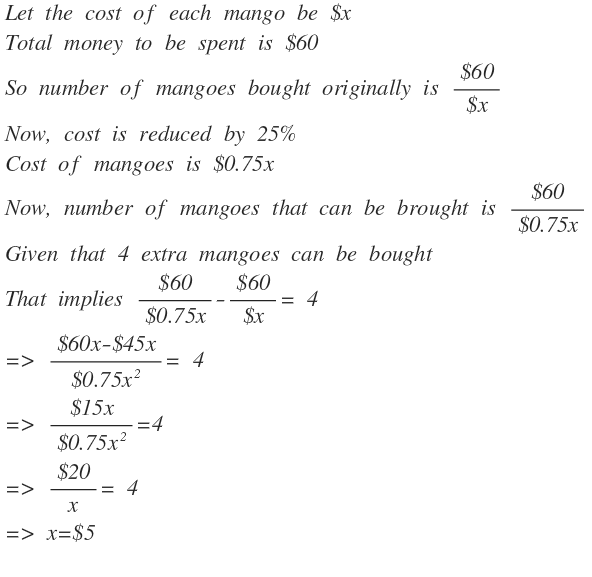Mango logic
Since price of mangoes decreases by 25%, I can purchase 4 mangoes more for 60$. Find the original price of 1 mango.
please explain the solution in comments thank you
The answer is 5.00.
This section requires Javascript.
You are seeing this because something didn't load right. We suggest you, (a) try
refreshing the page, (b) enabling javascript if it is disabled on your browser and,
finally, (c)
loading the
non-javascript version of this page
. We're sorry about the hassle.
4 solutions
Original price of one mango= x Let's assume that the man originally bought y mangoes. Then:
xy = 60
0.75(x)(y + 4) = 60 => 0.75(60) + 3x = 60
x = (60 - 45)/3 = 5 rs.
P * Q = E
P= PRICE OF 1 QUANTITY
Q=NO. OF QUANTITY
E= EXPENDITURE OR TOTAL PRICE
let us assume that my total expenditure is 60$ i.e
p * q = 60 ............a
now when the price decreases by 25% quantity increases by 4 for 60$ which means 0.75p * (q+4)=60
=>0.75pq + 3p = 60
but pq=60 from a
so
=>0.75 * 60 +3p=60 =>p=5 hence original price of 1 mango is 5$.
The equation should be 6 0 = P Q = ( 0 . 7 5 P ) ( Q + 4 ) .
This gives us 3 1 Q = 4 , so Q = 1 2 and P = 1 2 6 0 = 5 .
You can verify that when price decreases by 25% to 5 × 4 3 = 3 . 7 5 , then you can buy 3 . 7 5 6 0 = 1 6 mangoes, which gives us 4 more.
Edit: Calculation error initially.
Log in to reply
sir what's wrong in this solution P * Q = E
P= PRICE OF 1 QUANTITY
Q=NO. OF QUANTITY
E= EXPENDITURE OR TOTAL PRICE
let us assume that my total expenditure is 60$ i.e p * q = 60 ............a
now when the price decreases by 25% quantity increases by 4 for 60$ which means 0.75p * (q+4)=60
=>0.75pq + 3p = 60
but pq=60 from a
so =>0.75 * 60 +3p=60
=>p=5
hence original price of 1 mango is 5$.
Cost = Price × Quantity
1 = (3/4) × (4/3)
100% = (100% – 25%) × (100% + 33⅓%)
4 is the extra mangoes we get to buy from the drop of price, so it's the increase of 33⅓% from the original quantity.
Original quantity
= 4 ÷ 33⅓%
= 12
Original price
= 60 ÷ 12
= $5.00
